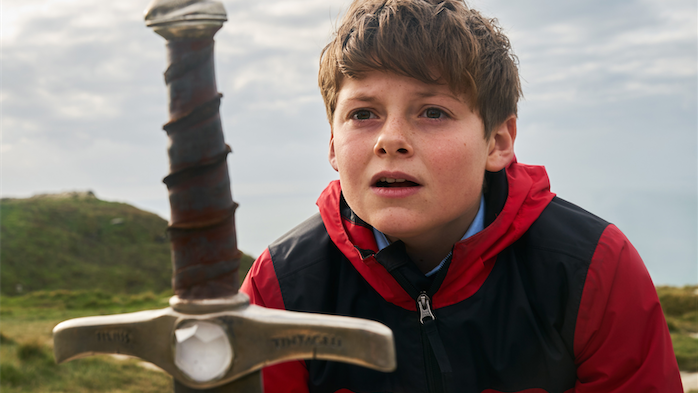Cornish Finds Some Magic In Traditional "King" Tale
By J. T. Kolness
It's hard to believe Joe Cornish only releasing his second directorial feature, given it's been eight years since his first and previous breakout midnight-madness smash Attack the Block. Cornish has long worked with filmmaker Edgar Wright and even collaborated with the likes of Steven Spielberg and Peter Jackson with the script to 2011's The Adventures of Tintin: The Secret of the Unicorn, also eight years ago. Cornish seemed like he was truly planting his flag in the industry, but so much time had passed until now with not any much to his credit other than helping craft the screenplay of Ant-Man (2015) with Edgar Wright... years before the script was reworked by Paul Rudd and Adam McKay. So why has this talented filmmaker been such a recluse? Perhaps he was just waiting for the right project or maybe he just felt like hibernating. Somehow, things managed to come together for Cornish, who finally delivers The Kid Who Would Be King, a medieval children's fantasy based off of the King Arthur legend.
Louis Ashbourne Serkis (yes, son of Andy Serkis- and quite the resemblance) plays a young schoolboy named Alex, who stumbles upon the sword Excalibur in an abandoned construction site. After pulling the sword from the stone, he awakens Arthur's half-sister Morgana (Rebecca Fergusson) from her hellish slumber and with the surprise guidance of a teenager claiming to be the famous ancient wizard Merlin (Angus Imrie) and the help of schoolmates Lance, Kaye, and Bedders (Tom Taylor, Rhianna Doris, and Dean Chaumoo), they all must abandon the lives they once knew to defend Britian from an army of undead knights. A fairly straight-forward premise that any more average filmmaker would have followed to convention to a dullish degree, in ways we've seen before. And while Cornish doesn't really reinvent the wheel, he does have a few tricks up his sleeve to spark some life into this mildly enjoyable children's fantasy.
Following up the wildly inventive urban sci-fi comedy Attack the Block (the film that put now-Star Wars alum John Boyega on the map) was always going to be a tough task. Cornish takes samples of what he's done before (London youth teaming up to take down supernatural forces) but for a far younger audience. While it does take the bite out of his style a tad bit to skew towards kids more than adults, Cornish is still able to use the family-film template as his own personal playground to find some wonderfully daft fun, while honoring the Knights of the Round Table source material, using the famous text as an instruction manual rather than just a crutch for a concept. Fans that don't want to see their beloved historic medieval legend watered down and tampered with can rest easier with the film's use of these story elements than what the normal Hollywood family film would have wasted with lesser talent behind the camera. It certainly does a far better less-insulting job than whatever the hell Transformers: The Last Knight was trying to do with it.
Most of the funny bits come from Angus Imrie as Merlin. Patrick Stewart portrays Merlin in his elderly form, but is only used onscreen for Stewart's gravitas to deliver the more important and weighty lines of guidance in the film. Imrie portrays Merlin for most of the film and captures the perfect blend of sheer lunacy and daft wit, fully embracing his fish out of water character. Dean Chaumoo is charmingly cast as Alex's best friend Bedders ("the Chewie to his Han", as Bedders states in the film). Rhianna Doris and Tom Taylor do perfectly fine work as the other Knights of the Round Table, although neither are given as much depth as they probably should. Serkis carries the film confidently and impressively, probably having learned a lot from his father and or just being a true natural onscreen talent. Rebecca Ferguson as Morgana, though, attempts to chew scenery but is only given scraps to work with.
Pacing issues may be the film's greatest weakness, though, in need of about a 10-15 minute trim. What begins with a surprisingly engaging and clever first third makes way for a second act that is meant to find the film's emotional center, but end up sucking some of the energy out of the story. Cornish jumps right back into the fun he set up with in the beginning with a third act that consists of an entire school student body defending themselves against an undead army and this is where it feels the most like the Cornish we got in Attack the Block. Not to say he needs to repeat himself, but it is pleasant to see that he's still got some of his unique flavor to show off, even if it is at the cost of a few instances of questionable story logic and some dodgy effects work. But as a film purely for the family, perhaps its greatest strength is its earnest heart and solidly portrayed hard-knock-life lessons that young kids like Serkis' Alex can latch onto. Throughout all the chaos and wham-bam wizardry, the lessons of nobility and truth are what Cornish seems to be most concerned with, and in the end, it is earned.
“The Kid Who Would Be King,” a 20th Century Fox release, is rated PG for fantasy action violence, scary images, thematic elements including some bullying, and language. Running time: 120 minutes. Two and a half stars out of four.

Comments
Post a Comment